 Boggle
Boggle
Write a program to play the word game Boggle®.
The Boggle game. Boggle is a word game designed by Allan Turoff and distributed by Hasbro. It involves a board made up of 16 cubic dice, where each die has a letter printed on each of its 6 sides. At the beginning of the game, the 16 dice are shaken and randomly distributed into a 4-by-4 tray, with only the top sides of the dice visible. The players compete to accumulate points by building valid words from the dice, according to these rules:
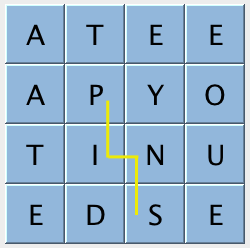 |
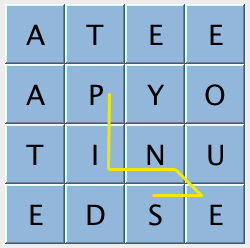 |
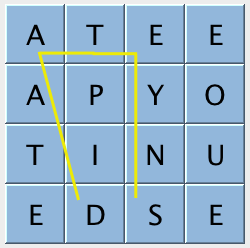 | ||
PINS(valid) |
PINES(valid) |
DATES(invalid—dice not adjacent) | ||
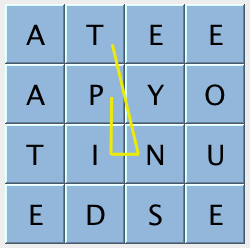 |
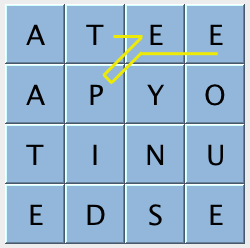 |
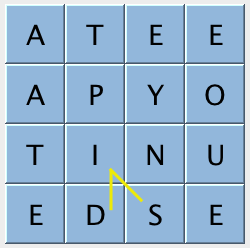 | ||
PINT(invalid—path not sequential) |
TEPEE(invalid—die used more than once) |
SID(invalid—word not in dictionary) |
Scoring.
Valid words are scored according to their length, using this table:
word length points 3–4 1 5 2 6 3 7 5 8+ 11
The Qu special case.
In the English language, the letter Q is almost always followed by the letter
U.
Consequently, the side of one die is printed with the two-letter sequence Qu
instead of Q (and this two-letter sequence must be used together when forming words).
When scoring, Qu counts as two letters; for example, the word QuEUE
scores as a 5-letter word even though it is formed by following a sequence of only 4 dice.

Your task.
Your challenge is to write a Boggle solver that finds all valid words in a given Boggle board, using
a given dictionary.
Implement an immutable data type BoggleSolver with the following API:
It is up to you how you search for and store the words contained in the board, as well as the dictionary used to check them.public class BoggleSolver { // Initializes the data structure using the given array of strings as the dictionary. // (You can assume each word in the dictionary contains only the uppercase letters A through Z.) public BoggleSolver(String[] dictionary) // Returns the set of all valid words in the given Boggle board, as an Iterable. public Iterable<String> getAllValidWords(BoggleBoard board) // Returns the score of the given word if it is in the dictionary, zero otherwise. // (You can assume the word contains only the uppercase letters A through Z.) public int scoreOf(String word) }
The board data type.
We provide an immutable data type
BoggleBoard.java for
representing Boggle boards.
It includes constructors for creating
Boggle boards from either the 16 Hasbro dice, the distribution of letters in
the English language, a file, or a character array; methods for accessing
the individual letters; and a method to print out the board for debugging.
Here is the full API:
public class BoggleBoard { // Initializes a random 4-by-4 Boggle board. // (by rolling the Hasbro dice) public BoggleBoard() // Initializes a random m-by-n Boggle board. // (using the frequency of letters in the English language) public BoggleBoard(int m, int n) // Initializes a Boggle board from the specified filename. public BoggleBoard(String filename) // Initializes a Boggle board from the 2d char array. // (with 'Q' representing the two-letter sequence "Qu") public BoggleBoard(char[][] a) // Returns the number of rows. public int rows() // Returns the number of columns. public int cols() // Returns the letter in row i and column j. // (with 'Q' representing the two-letter sequence "Qu") public char getLetter(int i, int j) // Returns a string representation of the board. public String toString() }
Testing. The zip file boggle.zip contains a number of sample boards and test files.
A through Z.
For example, here are the two files
dictionary-algs4.txt and
dictionary-yawl.txt:
~/Desktop/boggle> cat dictionary-algs4.txt ABACUS ABANDON ABANDONED ABBREVIATE ... QUEUE ... ZOOLOGY ~/Desktop/boggle> cat dictionary-yawl.txt AA AAH AAHED AAHING ... PNEUMONOULTRAMICROSCOPICSILICOVOLCANOCONIOSIS ... ZYZZYVAS
The former is a list of 6,013 words that appear in Algorithms 4/e; the latter is a comprehensive list of 264,061 English words (known as Yet Another Word List) that is widely used in word-game competitions.
A through Z
(with the two-letter sequence Qu represented as either Q or Qu).
For example, here are the files board4x4.txt
and board-q.txt:
~/Desktop/boggle> cat board4x4.txt 4 4 A T E E A P Y O T I N U E D S E ~/Desktop/boggle> cat board-q.txt 4 4 S N R T O I E L E Qu T T R S A T
public static void main(String[] args) { In in = new In(args[0]); String[] dictionary = in.readAllStrings(); BoggleSolver solver = new BoggleSolver(dictionary); BoggleBoard board = new BoggleBoard(args[1]); int score = 0; for (String word : solver.getAllValidWords(board)) { StdOut.println(word); score += solver.scoreOf(word); } StdOut.println("Score = " + score); }
Here are two sample executions:
~/Desktop/boggle> java-algs4 BoggleSolver dictionary-algs4.txt board4x4.txt AID DIE END ENDS ... YOU Score = 33 ~/Desktop/boggle> java-algs4 BoggleSolver dictionary-algs4.txt board-q.txt EQUATION EQUATIONS ... QUERIES QUESTION QUESTIONS ... TRIES Score = 84
Performance. If you choose your data structures and algorithms judiciously, your program
can preprocess the dictionary and find all valid words in a random Hasbro board
(or even a random 10-by-10 board) in a fraction of a second.
To stress test the performance of your implementation, create one BoggleSolver
object (from a given dictionary); then, repeatedly generate and
solve random Hasbro boards. How many random Hasbro boards can you solve per second?
For full credit, your program must be able to solve thousands of
random Hasbro boards per second.
The goal on this assignment is raw speed—for example, it's fine to use 10× more memory if
the program is 10× faster.
Interactive game (optional, but fun and no extra work).
Once you have a working version of BoggleSolver.java,
download, compile, and run BoggleGame.java
to play Boggle against a computer opponent.
To enter a word, either type it in the text box
or click the corresponding sequence of dice on the board.
The computer opponent has various levels of difficulty, ranging from finding
only words from popular nursery rhymes (easy) to words that appear in Algorithms 4/e (medium)
to finding every valid word (humbling).
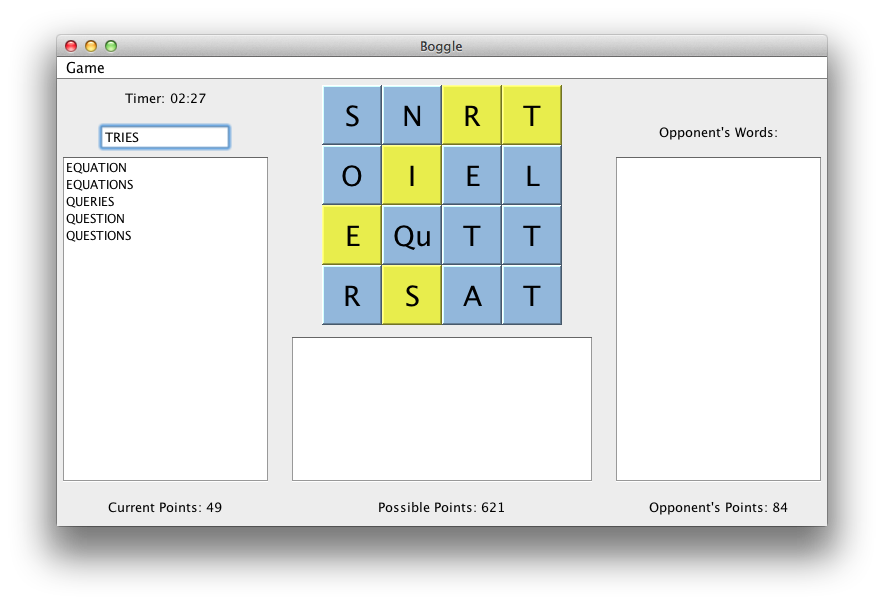
Challenge for the bored. Here are some challenges:
Qu.
Web submission.
Submit a .zip file containing
Submit BoggleSolver.java and any
other supporting files (excluding BoggleBoard.java and algs4.jar).
You may not call any library functions except those in
java.lang, java.util, and algs4.jar.